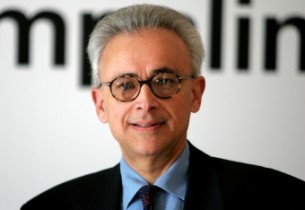Norman Geschwind
From Psy3241
| (3 intermediate revisions not shown) | |||
| Line 1: | Line 1: | ||
[[Category:Neuropsychological profiles]] | [[Category:Neuropsychological profiles]] | ||
| + | |||
| + | [[Image:Norman_geschwind.jpg]] | ||
| + | == Biography == | ||
| + | |||
| + | Norman Geschwind (1926-1984)was born in New York City and later attended Harvard University to study Mathematics. His education was interrupted when he was matriculated into the Army. Upon returning to Harvard, Geschwind changed his major to Social Relations and later attended medical school. For the majority of Geschwind's medical career he focused on neuroanatomy specifically focusing on the neurological basis of language and higher cognitive functions at the Neurology Department of the Boston Veterans Administration Hospital. Geschwind's inspiring personality is said to have sparked interest among colleagues in the field of Behavioral Neurology, which has grown remarkably in the past three decades. | ||
| + | |||
| + | |||
| + | == Contributions to Neuroscience == | ||
| + | Norman Geschwind is perhaps most famous for coining the term Behavioral Neurology which encompasses the areas of Neuropsychology and Higher Cortical Functions. Norman Geschwind has also been called the father of American behavioral neurology. Along with cofounding the Boston University Aphasia Research Center, Geschwin was also a respected professor at Harvard Medical School. He specialized in teaching about anatomical hemispheric differences, writing about biological foundations of cerebral dominance, and lecturing about aphasia, epilepsy and dyslexia. In honor of Dr. Geschwind, the Norman Geschwind Award in Behavioral Neurology is awarded annually through the American Academy of Neurology and the Society of Behavioral and Cognitive Neurology. In addition there is a Norman Geschwind-Rodin prize for research in dyslexia presented in Sweden. | ||
| + | |||
| + | |||
| + | |||
| + | |||
| + | == References == | ||
| + | |||
| + | Duane, D. (2002). ''Norman Geshwind lecture: Geschwind's lesson''. Annals of Dyslexia: 52(25). | ||
| + | |||
| + | Landis, T. (1998), ''Behavioral neurology and the legacy of Norman Geschwind''. European Neurology: 40(2) | ||
| + | |||
| + | http://en.wikipedia.org/wiki/Norman_Geschwind | ||
Current revision as of 01:50, 29 April 2008
Biography
Norman Geschwind (1926-1984)was born in New York City and later attended Harvard University to study Mathematics. His education was interrupted when he was matriculated into the Army. Upon returning to Harvard, Geschwind changed his major to Social Relations and later attended medical school. For the majority of Geschwind's medical career he focused on neuroanatomy specifically focusing on the neurological basis of language and higher cognitive functions at the Neurology Department of the Boston Veterans Administration Hospital. Geschwind's inspiring personality is said to have sparked interest among colleagues in the field of Behavioral Neurology, which has grown remarkably in the past three decades.
Contributions to Neuroscience
Norman Geschwind is perhaps most famous for coining the term Behavioral Neurology which encompasses the areas of Neuropsychology and Higher Cortical Functions. Norman Geschwind has also been called the father of American behavioral neurology. Along with cofounding the Boston University Aphasia Research Center, Geschwin was also a respected professor at Harvard Medical School. He specialized in teaching about anatomical hemispheric differences, writing about biological foundations of cerebral dominance, and lecturing about aphasia, epilepsy and dyslexia. In honor of Dr. Geschwind, the Norman Geschwind Award in Behavioral Neurology is awarded annually through the American Academy of Neurology and the Society of Behavioral and Cognitive Neurology. In addition there is a Norman Geschwind-Rodin prize for research in dyslexia presented in Sweden.
References
Duane, D. (2002). Norman Geshwind lecture: Geschwind's lesson. Annals of Dyslexia: 52(25).
Landis, T. (1998), Behavioral neurology and the legacy of Norman Geschwind. European Neurology: 40(2)

